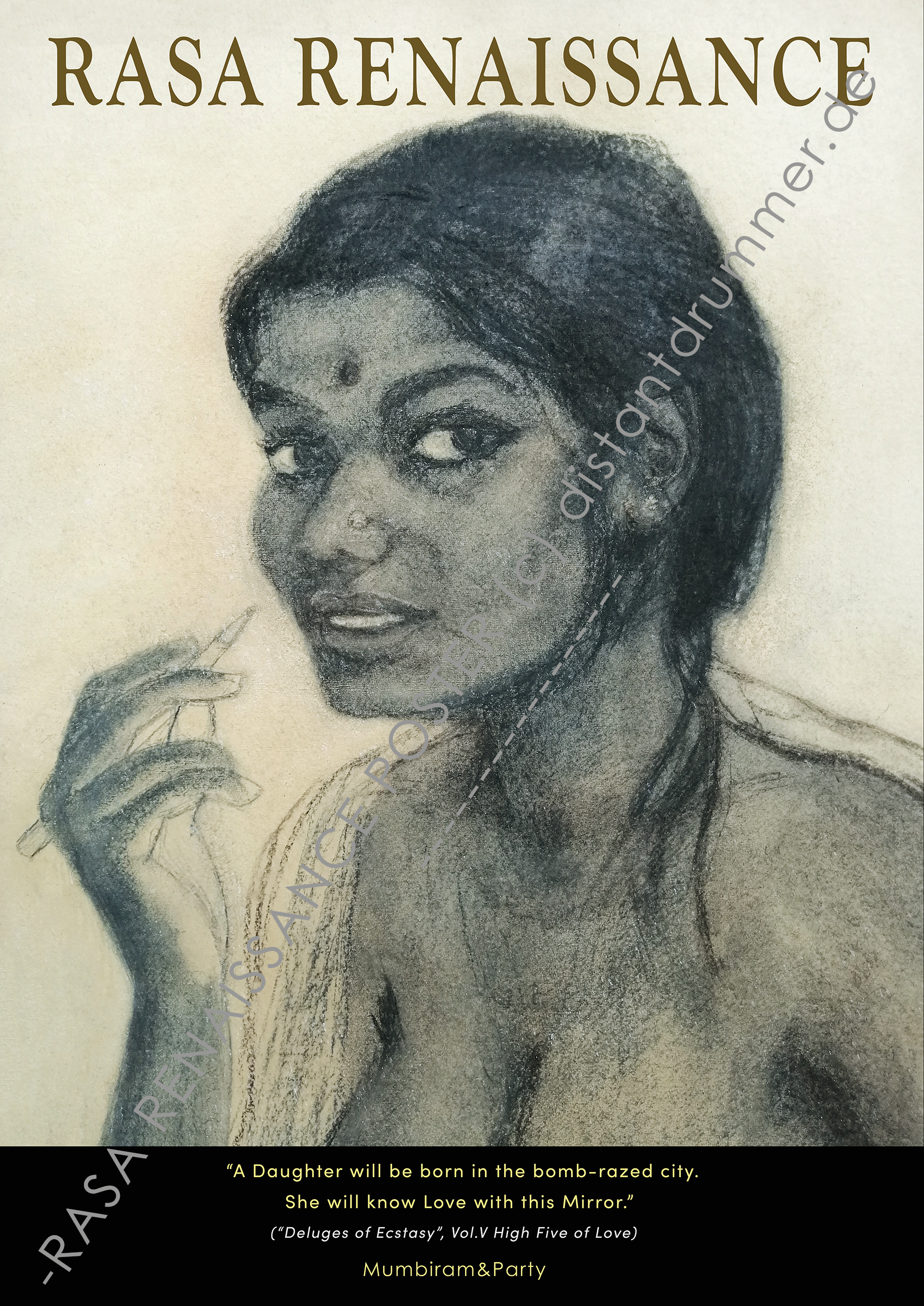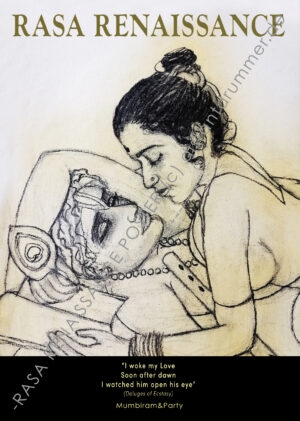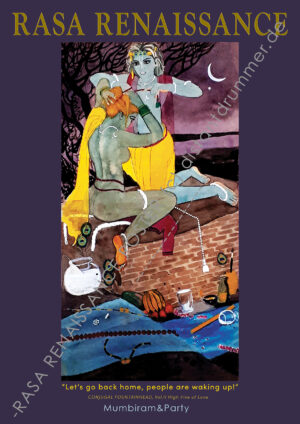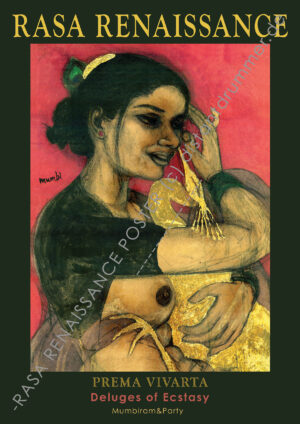“The Mirror of Love” Poster
108,00 € – 208,00 €
incl. VAT plus Shipping Costs
Rasa Renaissance Poster based on original charcoal “The Mirror of Love” by Artist Mumbiram
with Verse from Mumbiram’s “Deluges of Ecstasy”
Collector’s item individually signed by Artist Mumbiram
Description
Rasa Renaissance Poster based on original charcoal “The Mirror of Love” by Artist Mumbiram
Caption on the Poster:
“A Daughter will be born in the bomb-razed city.
She will know love with this Mirror.”
(Deluges of Ecstasy, Vol.V High Five of Love)
Mumbiram&Party
-
High Quality Print (semi gloss paper, 195g/m2)
-
Available in 3 Sizes:
A2 (42x59cm)
A1 (59x84cm)
A0 (84x118cm)
This is a collector’s item. You will get your Rasa Poster individually signed by Artist Mumbiram.
Rasa Appreciation of original Charcoal
“Mirror of Love”
(Charcoal, 1990, Mumbiram)
Mumbiram’s friendship with his muses was always a subject of great curiosity to those who were attracted to this artist and his art.
Mumbiram has long since been involved in friendship with German men and women. He has had intimate involvements with young Japanese men and women also. This is perhaps the only place in Mumbiram’s painting or writing that we find mention of war or violence. What then was Mumbiram’s take on these ever-present unavoidable facets of human society ?
Mumbiram was acutely aware how destructions that wars bring have deeper, wider and invisible effects that are hauntingly oppressive. It truncates your connection to the progressive march of human civilization. It disrupts traditions that shape culture. It alienates society from natural springs of emotions. It alienates future generations from Rasa.
Mumbiram grew up in part of India that did not see war for the last 200 years. He was born just a few months before India gained its independence through non-violent struggle as laid down by Mahatma Gandhi. Mumbiram had great empathy towards post-war generations of countries that were ravaged by the second world war. He experienced uncanny attraction towards them. Mumbiram has had intimate friendships with incredibly beautiful “souls in German and Japanese bodies”. Off course he hardly ever mentioned the subject of war in his friendships with individuals from such countries. That was the sensitive and sensible approach. This is the only place where Mumbiram has touched upon that subject.
Mumbiram was equally, if not more, sensitive to the slow and silent war of attrition and discrimination that drains large sections of population of their dignity as well as humanity. Mumbiram had gut sympathy for all those who grow up in circumstances that deprive them of equality of opportunity in life.
In the Indian society the caste system continues to propagate an unjust dispensation. In the international arena the managed inequitable exchange rate regime perpetuates economic injustices that we thought would end with the end of the colonial regimes. These are the two great injustices that moved young Mumbiram.
At the end of his remarkable academic career Mumbiram already had the realization that destinies of individuals and societies are determined by the aesthetic choices they make, more than by any economic or social transformations they undergo. Rasa Renaissance is the outcome of this profound realization. It is about connecting to the real spring of all emotional and spiritual fulfillment: Rasa. It is here and now. It begins with you and I.
Through his own life that he lived guided by the aesthetic choice Mumbiram has shown the magical prowess that Art harbors. In Mumbiram’s own words:
“Art should redden the west as much as the east.
Art should bridge the gap between man and woman.
Art is to bridge the gap between the space age
and the bow-and- arrow age.
Art should be the great antidote
for the maladies of the Material World.
Art should render economic disparity toothless.
Art should give wings to man.”
Discovering Rasa Renaissance is like discovering the magic mirror that divulges to you your own unique emotional essence and your own unlimited potential to fulfill your unique innate aspirations.
These lines quoted here are from “Iceberg in the Bayou”, the second book of the “Deluges of Ecstasy” trilogy published by Distant Drummer. The swarthy beauty that is looking directly at you is a favorite muse of Mumbiram. She could also be looking at her own reflection in the mirror in front of her. She is holding up a pencil in her hand. She means to use it. In real life she might even have been a rag picker. Here she has the same alacrity and aplomb as Rasa Artist Mumbiram himself. She could easily have made this Rasa Portrait herself.
Related products
-
- Rasa Renaissance Poster
“I woke my Love” Poster
- 108,00 € – 208,00 €
- Select options This product has multiple variants. The options may be chosen on the product page
-
- Rasa Renaissance Poster
“Let’s Go Back Home” Poster
- 108,00 € – 208,00 €
- Select options This product has multiple variants. The options may be chosen on the product page
-
- Rasa Renaissance Poster
“Manjishtha’s Ecstasy” Poster
- 108,00 € – 208,00 €
- Select options This product has multiple variants. The options may be chosen on the product page




